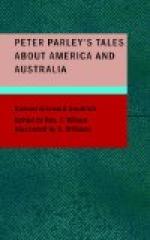By these means Ferdinand was at last induced to send out Bobadilla, an officer of the royal household, to inquire into the conduct of Columbus, and if he should think the charges against him proved, to supersede him in his command, that is, to send him home, and make himself governor in his stead; so that it was the interest of the judge to pronounce the person guilty whom he was sent to try.
On his arrival he found Columbus absent in the interior of the island; and as he had, before he landed, made up his mind to treat him as a criminal, he proceeded at once, without any inquiry, to supersede him in his command.
He took up his residence in Columbus’ house, from which the owner was absent, seized upon his arms, gold, plate, jewels, books, and even his letters and most secret manuscripts, giving no account of the property thus seized, but disposing of it as if already confiscated to the crown; at the same time he used the most unqualified language when speaking of Columbus, and hinted that he was empowered to send him home in chains; thus acting as if he had been sent out to degrade the admiral, not to inquire into his conduct.
As soon as Columbus arrived from the interior, Bobadilla gave orders to put him in irons and confine him in the fortress, and so far from hearing him in his defence, he would not even admit him to his presence; but having collected from his enemies what he thought sufficient evidence, he determined to send both him and his brother home in chains.
The charge of conducting the prisoners to Spain was committed to Alonzo Villejo, a man of honourable conduct and generous feelings. When Villejo entered with the guard to conduct him on board the caravel, Columbus thought it was to conduct him to the scaffold. “Villejo” said he, “whither are you taking me?” “To the ship, your excellency, to embark,” replied the other. “To embark!” repeated the admiral, earnestly, “Villejo, do you speak the truth?” “By the life of your excellency,” replied the honest officer, “it is true.”
With these words the admiral was comforted, and felt as restored from death to life, for he now knew he should have an opportunity of vindicating his conduct. The caravel set sail in October, bearing off Columbus shackled like the vilest criminal.
The worthy Villejo, as well as Andries Martin, the master of the caravel, would have taken off his irons, but to this he would not consent. “No,” said he proudly, “their majesties commanded me, by letter, to submit to whatever Bobadilla should order in their name; by their authority he has put upon me these chains; I will wear them till they shall order them to be taken off, and I will afterwards preserve them as relics and memorials of the reward of my services.”
[Illustration]
The arrival of Columbus, a prisoner and in chains, produced almost as great a sensation as his triumphant return on his first voyage.




